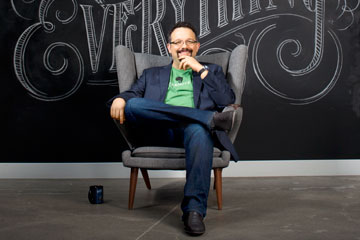
Phil Libin, CEO of Evernote, says the companys mission is to make information available everywhere all the time.
(3 of 4)
Enter Libin, an immigrant from Russia who arrived in New York City with his family at the age of 8 in 1979. After graduating from the Bronx High School of Science and dropping out of Boston University's computer-science program, he founded and sold two startups. They were successful but not all that spiritually fulfilling. By 2007, Libin and some collaborators were hatching plans for a more meaningful venture. "We wanted to do something permanent," he says. "Let's only build a product we want to use and build a company to keep."
They toyed with a concept called Ribbon, a wearable gadget for capturing your life by recording audio and video automatically, but concluded that the idea would be better implemented as software for mobile phones. That's when Libin found Pachikov. The two teams met in early 2007, bonding over their similar goals. Pachikov says he knew within 30 minutes that Libin should be running the show. Libin moved to the Bay Area and became CEO in May; Pachikov became a board member.
As Evernote rebooted itself, the entire technology industry was doing so on a grand scale. The iPhone ushered in an era of powerful mobile devices that were even more personal than PCs. Traditional software was beginning to be displaced by services hosted in the cloud. So the company started over. Going forward, it would create apps for as many platforms as possible and store data on its own servers, not users' computers. When Apple launched the iPhone App Store in July 2008, Evernote was one of the first pieces of software available, and it quickly became a popular download.
Still, it wasn't immediately clear that the new Evernote would be more viable than the last. Libin wanted to raise venture funding, but with the financial crisis in full swing, he found no takers. But eventually, the service started to take off. In May 2009, it reached a million users, a figure that doubled by the end of the year and tripled a year after that. By December 2011, the company hit 20 million users. As people stored more and more information, they found Evernote harder to live without--and more worth paying for. "Once a consumer adopted Evernote and stuck with it, the ones who stuck, stuck forever," says chief operating officer Ken Gullicksen. Before joining the company, Gullicksen was a venture capitalist at Morgenthaler Ventures, an Evernote investor.
The service also proved to have strong international appeal. Early on, the company's executives were surprised to discover that people in Japan were flocking to it--even before there was a Japanese-language version. That paid off in September 2009, when the country's largest wireless carrier, NTT Docomo, invested $2 million in Evernote--before the venture capitalists back in Silicon Valley bought Libin's pitch. Today 74% of users are outside the U.S. The company is also growing rapidly in China, where the service is known as Yinxiang Biji and runs entirely on servers located in that country. (The Great Firewall hobbles access to the version hosted outside Chinese borders.)
